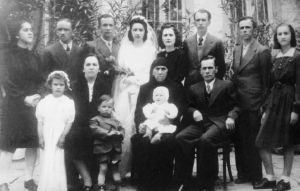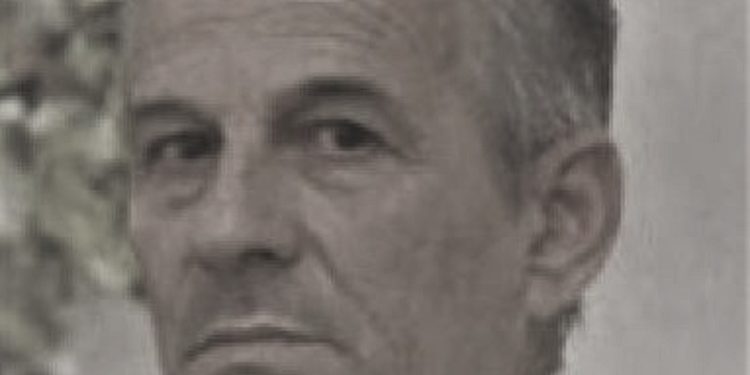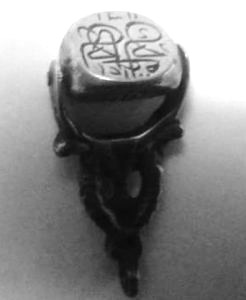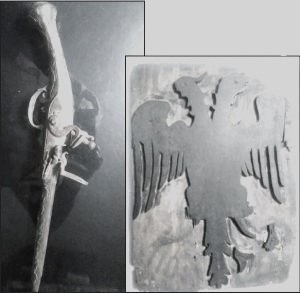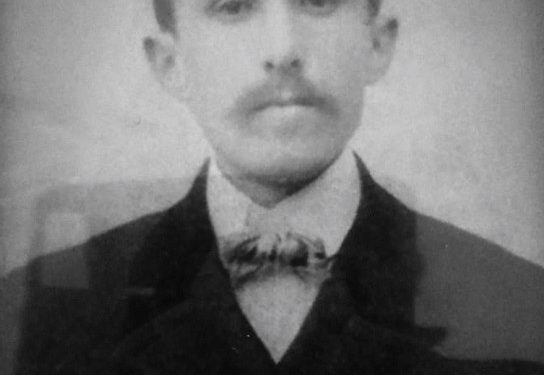From Vepror Hasani
-A tragic event that shook the city of “Summer Flowers” –
Memorie.al / In the city of “Summer Flowers”, a tragic event happened. This is what the great merchant of this city, Abedin Efendi Tyxhari, called Korça. He baptized it with this name, when the book of poems “Summer Flowers” fell into his hands. It is very likely that the book was given to him by Naim Frashëri himself, in 1890, when this beautiful work with 16 lyrical poems was published. He went to Istanbul often. He dedicated his whole life to the Albanian language. There he met the Frashëri brothers, who wanted to turn Korça into an important center of the South.
Researcher Hamza Koçiu points out the cooperation of Abedin Efendi Tyxhari, also with the patriots of Istanbul: “Patriot Abedin Seit Tyxhari was one of the active participants in the National Renaissance movement in Korça, and one of the determined fighters in the development and progress of the school and Albanian education in Albania. He was born and raised in the beautiful city of Korça, in an old hearth of the great Tyxhar family, with well-known Albanian-loving traditions. This passionate revivalist of the Albanian language, this bright torch of it, has a busy biography, with a series of activities developed in Korça, Bucharest, Manastir and even faraway Istanbul”.(Hamza Koçiu, “Portraits of patriots of the Korçë district”, volume I, pg. 26).
One of the poems in the volume “Summer Flowers”, the national poet Naim Frashëri, wrote exclusively for Korça, where his mother, Emineja, was from, the daughter of the Mirahors, the founders of the city of Korça, exactly the daughter of Islam Mirahori and Zymbyla. Zymbylja herself (Emine’s mother), was the daughter of Mehmet Pasha Zëmblak, a descendant of Sinan Pasha, the most powerful Pasha of Toscana. Emineja married Halit in Frashër, with whom she had 6 sons and 2 daughters.
But already in the tribe of Tyxhars, a serious event had happened. Shefqet Tyxhari, a well-known merchant from the city of Korça, was found dead in the large house where they lived, down to the basements. It was the year 1948. Shefqeti was found at the first moment, when he had just passed away. Warm blood still flowed from the cut veins of his hands, like a stream that never stops. Very close to his body, a bloody knife was found. The tobacconists were shocked. Was he killed or committed suicide? After a while, the doctor arrived, who, after performing the examination, said: “Shefqeti committed suicide”! However, family members neither confirmed nor denied suicide. They simply said: “Shefqeti also left us” – as if they were warning of other deaths.
Shefqet Tyxhari committed suicide, because the government from time to time asked for the hidden gold. Until then he had given them everything he had, but they wanted his soul. He was forced to choose the terrible end, rather than the endless horror. The women in the other room wept bitterly. Shefqet Abedin Efendi’s wife, Neime Rakip Bilishti, daughter of a well-known family, with great wealth, could not contain herself. Initially, she was married to Neim Abedin Tyxhar, with whom she had a son, Aliqemalin, but when her husband died, she married his brother, Shefqet Abedin Tyxhar. From this marriage, Samimi, Verorja, Sajdeja, Skenderi, Nazimi and Erveheja were born; together with Aliqemali from the first marriage, there were 7 children; 4 boys and three girls, who were all crying, with longing and sadness together.
Even Abedin Efendi Tyxhari, (although dead), should have felt the piercing pain of his son’s death. It had been 27 years since he died, when he was 70 years old, but such pains shake even the grave. If he were alive, he would never understand the horror that the city of “Summer Flowers” had begun to experience, but he would say to the people of the government: “Tyxars spent the gold, for the first Albanian teacher, for the Girls’ School, for opening other schools wherever it was possible, for providing students’ books and notebooks, for teachers’ payments, etc., etc. Abedin Tuxhari had become part of the secret National Committee of Korça, since the beginning of efforts to create it in 1885-1886.
By the spring of 1887, almost everything was ready. In 1888, the Committee was called the “Council of the Albanian Teacher”. This educational society, according to researcher Hysni Myzyri, “was tasked with providing financial resources and educational personnel, publishing textbooks, publishing a weekly or monthly newspaper in the Albanian language, and helping to protect schools Albanians from their enemies and overcoming all the difficulties and obstacles that would come before the Albanian school”.(The first Albanian national schools, Hysni Myzyri, pg. 69, Tirana 1973).
But for this Council, only three names are mentioned: Thimi Marko, Orhan Pojani and Vani Cico Kosturi. In this trio, there is no mention of Qani bey Dishnica, the head of the “Teacher’s Council” as his strong hand, nor Abedin efendi Tyxhari, as the brain of this organization, nor Sami bey Pojani, the publisher of the first Albanian newspaper in Albania, and many other names, which have already been forgotten, even though this society, at the top of the time, had not 3 members, but 160. Thus, researcher Hysni Myzyri, writes: “The society had over 160 members, Albanians were part of it. of both faiths and belonged to different social strata”.(The first Albanian national schools, Hysni Myzyri, pg. 70, Tirana 1973).
But from what was understood since the death of Shefqet Tyxhar, the people who came to power had decided to remove the rich people from the list, regardless of their contributions. At the death of Shefqet Tyxhar, the merchants of Korça had also come; the Merdans, the well-known merchants, were also there. They had occasional quarrels with them. Nadireja, the sister of the merchant Fuat Merdani, was married at the door of Tyxhar, to Aliqemali, while Verorja e Tyxhar, daughter of Shefqet Tyxhar, was married to the great merchant, Reshat Merdani. Often, Razia, Shefqet Tyxhar’s sister, could be heard shrieking, whom they tried to calm down and couldn’t.
Her brothers, Neimi and Abedin Tyxhari, felt equally depressed when they saw their sister pulling out her hair. The men smoked sadly. Shefqet’s brother, Neim Tyxhari, tried to explain to the people what had happened. Recently, Shefqet Tyxharin had started to be called more often to the Department of Internal Affairs. The last time he told him: “If they didn’t pay the taxes, then you should leave the house and take shelter in a basement, even in the basement of your houses, because there will be other people living above you. And if you don’t take out the hidden gold, your house will be a prison.”
Shefqet Tyxhar’s answer was harsh. He had told them what the Tyxhars had done for the War: “Sami, together with Raqi Qirinxhiu, had kept the intendancy, values in food and money for the War. On the street of Qatrom, where Aliqemali had a two-story house, between the vineyards and the garden with trees, he had made it available to the War as a shelter for activists and armaments. The activity in the family, during the war, was led by Aliqemali and Samimi”. He had also spoken to them about Abedin Efendi Tyxhar. His help for Albanian schools never stopped. Today, we learn about his efforts from researchers.
In this regard, Hamza Koçiu writes: “His visible work was concretized in the great meeting of the Albanian Alphabet, held on February 14, 1910, in Korçë. After this rally, he was elected to the commission that would deal with the opening of new Albanian schools, and their protection from the Young Turks and the reactionary Orthodox clergy. According to the newspaper “Lidhja Orthodoxe”, dt. February 22, 1910, the following patriots were elected to the Commission: Çerçiz Zavalani, Abedin Efendi Tuxhari, Haki Hysen Floqi, Stavre Karoli, Qazim Drësniku and Sulejman Mborja. According to this newspaper, Abedin Tyxhari, as a member of the commission, took part in the drafting of the alphabet and signed this document, which openly proclaimed reading and writing in the Albanian language, in all the cities of Albania.
This document was sent to Istanbul, the Grand Vizier, the Minister of the Interior, the Parliament of Turkey and the Albanian deputies. After the second congress of Bitola (1910), Abedini Seit Tyxhari, who himself participated in this great historical event, for the development of Albanian education, developed his activity in the “Progress” school society.(Hamza Koçiu, “Portraits of patriots of Korçë district”, volume I, pp. 26-27).
From this time, Abedin Efendi Tyxhari remained the permanent elected by secret ballot of all school societies. The newspaper “Koha” writes: “On the 5th of this year, at the ‘Banda e Lirisa’, where the boys’ school is today, the general meeting of the School Society was held…! Then with votes, the permanent commission was elected according to canonism, as follows: Siri bey Leskoviku controller, Riza efendi Leskoviku, Stavre Karoli, Viskë Gorguzi, Qani bey Dishnica, Vasfi Iljaz Kole, Hazo Progri, Kristaq Aristidhi, dr. Haki Mborja, dr. Kristaq Zografi, Mihal Grameno, Qamil Panariti, Mustafa Selenica, Memdu bey Zavalani, Sotir Peci, Spiro Xega, Nesti Kerenxhi, Vani Qirko, Fehim Xhaferi, Memda Panariti and Abedin Tuxhari, members.
The program and purpose of this society is only school and it will take care to contain the schools of Korca and the Korca region, when it can contain them, so we do not doubt that all the patriots will help this society”.(Newspaper “Koha”, February 18, 1911).
A year later, the same newspaper wrote: “After dinner, everyone gathered in the Albanian school, with many gentlemen, who discussed whether school should be held or not, because for years the school elders, with much effort, were able to responds to the needs of the school, that very few patriots helped the school and decided that the school will be kept. So a new old age was chosen, which will be taken care of by these gentlemen: Orhan Pojani, Islam bej Këlcyra, Mina Frashëri, Abedin efendi Tuxhari, Stavri Karoli, Riza efendi Dërsiniku, Idhomene Kosturi and Andrea N. Katundi”.”Koha” newspaper, 22nd fall of 1st, 1912).
The best friends of Abedin Efendi Tyxhar were those who tried for the Albanian language. We are mentioning some of them, about whom the press has also written: Atdhetari i Flakte Emin Efendiu, who is a cork clerk in Korçë, realized that his own language elevates human thought and strengthens nationality, he put the nation forward and opened a school in his village, in Selenica (Frashër) (“Korça” newspaper, March 20, 1909);Baba Abedini from Frashëri village, his house in the village of Krushovë, he built it well and turned it into an Albanian school, and since the house is big, he also allocated some rooms for the students to sleep, who live far away” .(“Korça” newspaper, February 18, 1909);
About Qani Dishnica, who was not even afraid of death, it was said: “In every national issue, he was inseparable from the national goal. Vjet took on a very heavy burden, taking the presidency of the School Society, but he could not fulfill this burden, because another national duty called him elsewhere. Qani Dishnica was the first to take up arms and take the mountains to demand national rights. Special characters of Qani bey Dishnica are these: popular, wise, honest and a true patriot”. And the death of Ymer Zavalani poisoned everyone: “It is with great sadness that we announce the death of a patriot and old warrior, Ymer bey Zavalani, who died on the 11th of this year, after a long illness.
The deceased was a national warrior and in every movement he had taken sides defending national rights, therefore all Muslim and Christian patriots buried him with great honor in the eternal place…”!(“Koha” newspaper, January 30, 1913).We are not forgetting here either, Orhan bey Pojani, the tireless worker of the Albanian language.
On April 2, 1914, Abedin Efendi Tyxhari fought without sacrificing his life, against the Greek gangs, who aimed to annex Korça. According to the researcher, Hamza Koçiu. Abedin Tyxhari participated in the government commission for the protection of Korça. Members of the commission were: Emin Efendi, Ahmet Efendi, Shaqir Efendi, Rakip Efendi. Abedin Efendi Mborja, Miçe Çikozi, Abedin Efendi Tyxhari, Andrea Turtulli and Xhafer bey Luarasi. The bright patriot, Abedin Seit Tyxhari, never separated the rifle from the pen and never retreated at the time when Albania was threatened by the great danger of the Young Turks and neighboring chauvinists”.
Also, Abedin Efendi Tyxhari was elected a member of the Relations and Envoys Commission, which reported the situation to local and foreign authorities. The members of this commission were: “Chairman Emin Efendi, members: Maliq Bej, Ahmet Efendi the mayor of the Municipality; Shaqir Efendi, Emin Efendi, Rakipi Aga, Abedin Efendi Mborja, Miçe Çikozi, Vani Qirko, Abedin Efendi Tregtari (Tyxhari), Xhafer Bey Luarasi, Mehmet Ali Bey, Rakip Aga Jemenli and Andrea Turtulli”.(“Koha” newspaper, Saturday, May 24, 1914).
And although they had done so much for Korça and the country, now in their home, they had a dead person, due to the repression. However, when the news of the death of Shefqet Efendi Tyxhar spread, the great river of people poured towards the house of Tyxhar. The respect for the people of this tribe was great. Abedin Efendi Tyxhari and his descendants were the biggest benefactors of the city and always silent, they never remembered their kindnesses, because they called it a sin. The well-known researcher, Ilo Mitkë Qafëzezi, while accidentally finding a document from the year 1637, which talks about a meeting, which may not even have happened, while he notices that the Tyxhars are missing, expresses his surprise in this way:
“It is worth noting that in this regard, the assembly, there are only seven artisans’ guilds. The big isnaf of Kondakçinjvet (difekçinjvet) and ay of Bakërxhinjvet, who have flourished (progressed) for hundreds of years in Korça, as well as in Voskopojë, are missing in particular. Let these, and the corporations of Tyxharev are missing”!(“Leka” magazine, 1936). So, for Ilo Mitkë Qafëzezin, Tyxhars are large corporations of commercial activity. They were part of the “Brotherhood” society, since 1870, only to help people in need.
Here is the purpose of the society in question: “In 1870, in the city of Korça, the society ‘Brotherhood of Friends of the Poor’ was founded, with the aim of helping the poor, regardless of religion or nationality. The absence of such differences, for the group it intended to support, would also be in composition. Thus, membership in this brotherhood was not conditioned by profession or religion, which made it a true philanthropic society. Its activity would not be limited only to helping the poor, but also to supporting the opening of many schools in the province of Korça”.(A historical overview of the development of philanthropy in Albania, p. 135)
However, one day came when they were told to go down to the basement. The tobacconists gathered the most sacred things they had, and went out. Among the valuables, there were also two seals (myhyre) of Abedin Efendi Tyxhar, as a merchant, and the emblem with a skillfully carved eagle. Below it is written; “Long live Albania”. With this eagle, the pieces of the flag that was raised in Korça, on December 10, 1916, were sealed. Until today, there has been no explanation when this eagle was first carved, but the greatest possibility is that this emblem is prepared for the “Secret National Committee in Korça”.
During this time, Tyxhari often went to Istanbul, now not only for trade matters. On September 30, 1879, the patriots there had created the “Society of Shkronja Shqip Printing”, or as it was otherwise known, the “Society of Istanbul”, where they also had the flag of their society. Perhaps the eagle model was taken from the Istanbul Society. Such were the people of the Tyxhari tribe in Korça, they always thought the best for the country and the people. Memorie.al




